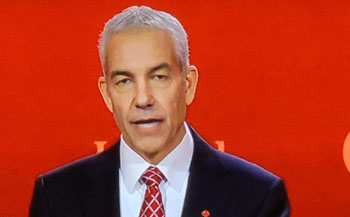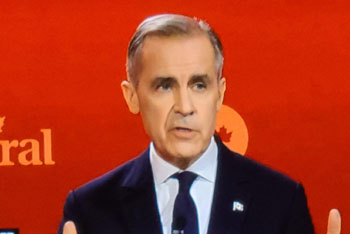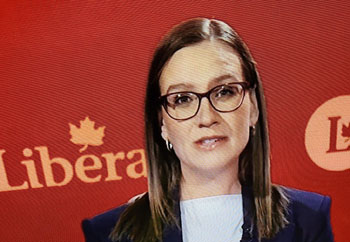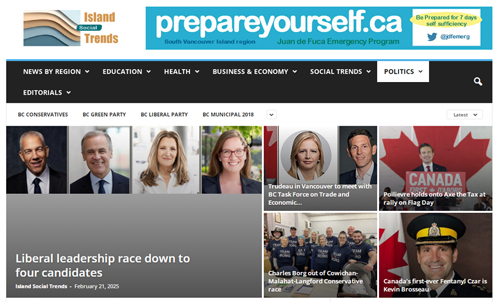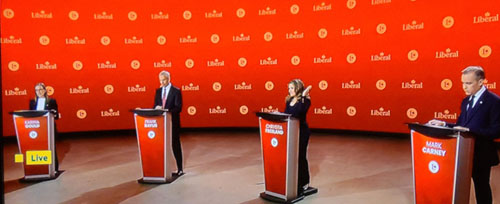
Wednesday February 26, 2025 | NATIONAL NEWS [Posted from VICTORIA, BC – 10:21 am]
by Mary P Brooke | Island Social Trends
Last night the four Liberal Party of Canada leadership candidates shared a stage in Montreal to evidently debate (in English) the issues that Canadians care about.
The candidates got good exposure to a Canada-wide audience last night. There are enough differences on economic policy and negotiating strategy with Trump to make this a tougher decision for Liberal Party voters than it might look.
But keeping it still quite friendly was the largest statement of all… the Liberals are reuniting their forces in a last minute effort to hold onto power by not letting Pierre Poilievre win for the Conservatives in this year’s general federal election.
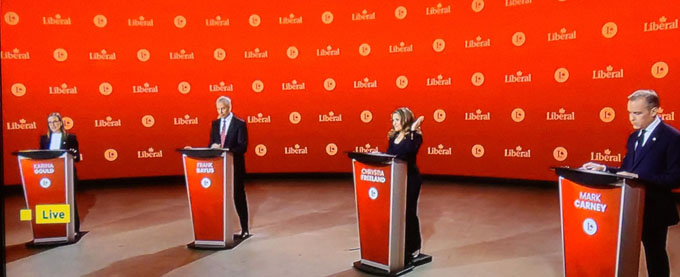
This debate was among ‘friends’, compatriots of the party that takes a governing class approach to politics. When they choose. There was little to no traction on even the key issue — of how to strengthen the economy and deal with Trump.
Governing to build a stronger more resilient and robust economy with solid infrastructure to support a growing population was for the most part not done over the last nine years.
Aside from advancements like child care, dental care and school food programs (all of which the NDP can be given credit in pushing for), the Liberals fell horribly short on housing supply and economic productivity, and allowed immigration policy to unbalance the sustainable functioning of cities and provinces. Despite some Liberal government efforts to liberate science and innovation, universities have been short-changed, relying in turn on international student registration with very high tuition fees.
The Liberals had nearly a decade to explain the consumer carbon tax in a way that people would understand how low-income Canadians have been given a life-raft with quarterly affordability rebates. Instead, the Liberal governemnt left the Conservatives a wide open door to create a cause around trashing it.

What the candidates presented and achieved:
Here is some analysis of last night’s two-hour debate (remembering that there were two audiences — Liberal Party members and the rest of Canada).
They all will have benefited in terms of being broadcast and livestreamed to a Canada-wide audience. Their main impediment last night was the chaotic management of the debate format by former CBC broadcaster Hannah Thibedeau.
Frank Baylis may have pleasantly surprised some viewers for whom he was new to the scene. He is quite clearly very comfortable in the world of big business and the realm of high-stakes negotiation. He was an MP for one term (2015-2019) so he is not new to how elected office works. His ideas for how to deal with Trump made him stand out from his contenders.
Mark Carney will continue to ride the crest of being deemed the ‘front runner’ in this leadership race; he does have dozens of endorsements from sitting cabinet ministers and MPs. He may find himself caught in a style conflict in playing up both where he was born (Northwest Territories) and raised (Edmonton) and the international investment and banking world (including as governor of two Commonwealth country banks). He says he has an economic plan for Canada but when he doesn’t clearly explain the economic term ‘productivity’ in a way that makes sense to the average voter, he shows room for improving his political communication skills.
Chrystia Freeland has worked hard on this leadership campaign which she says she finds “personally liberating”. She has only herself to blame for staying quiet for too long about her discomfort with the Trudeau style of governing. Liberal members and voters want to hear her substance. The fact that she contributed intel and grit to the NAFTA renegotiation during the first Trump administration seems somehow to fall short of what is needed now. She continued to show her ‘pleaser’ personality by helping out Carney during the French debate and gleefully congratulating last night’s moderator who really didn’t do a good job of managing the evening.
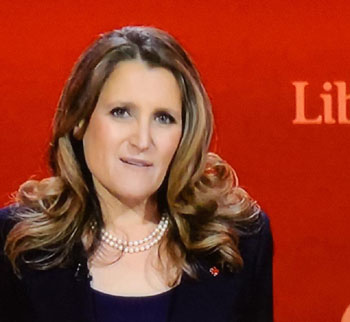
Karina Gould may not have been known to everyone across Canada but after last night she will be noted for future success in the Liberal Party. She has strong debating skills including directing the discourse with an awareness of the positions and weaknesses of her opponents. The Oxford-educated 37-year-old has set herself a runway to in front of Canadians even more in the years ahead. She appeared authentically as herself, focused on the issues, and offered a moment of hope for younger Canadians.
Different styles:
All four of these political aspirants are clearly intelligent and informed about the issues of the day. But their styles differ. [See Liberal leadership candidate profiles]

And that’s where voters will be looking to see who– if they become prime minister — has the chops to take on the economic crisis that is on the verge of escalating across the country.
Members will vote on March 9:
Canadians could sign up to be members of the Liberal Party of Canada up to January 27, 2025.
Nearly 400,000 registered members of the Liberal party signed up by that deadline, and will be eligible to vote in the 2025 Liberal leadership selection process.
So this is about one percent of Canada’s population choosing the next prime minister — at least for a short time (ahead of the upcoming federal election), but possibly positioning that person for the next round for a longer stint in the top job.
Gould offered the most clarity last night as to the turnaround time between new leader and calling a federal election — she would stretch that time out as long as possible.
The Liberals will use a ranked ballot (first, second and third choice). This ends up meaning that a second choice on the ballot might be a strong position if there is no clear winner on the first round and the vote moves to a second round.
As soon as a new Liberal leader is chosen on March 9, Prime Minister Justin Trudeau will step down, as he announced on January 6.
===== RELATED:
- Mark Carney wins 2025 Liberal leadership race (March 9, 2025)
- French Liberal leadership debate explored issues, strengthened family ties (February 25, 2025)
- Liberal leadership debate to cover Canada-US, economy, environment (February 24, 2025)
- Liberal leadership debates coming up Feb 24 & 25 (February 22, 2025)
- Liberal leadership race down to four candidates (February 21, 2025)
- Liberal leadership debates in Montreal Feb 24 & 25 (February 18, 2025)
- Liberals will grapple with style vs substance in choosing next leader (January 19, 2025)
- Parliament on pause as Liberals choose new leader (January 6, 2025)
- NEWS SECTIONS: LIBERAL PARTY of CANADA | CANADIAN FEDERAL ELECTION 2025 | TARIFFS & TRADE
- PREMIUM DIGITAL SUBSCRIPTIONS: Sign up forIsland Social Trends ENews (individual, small teams, corporate)



